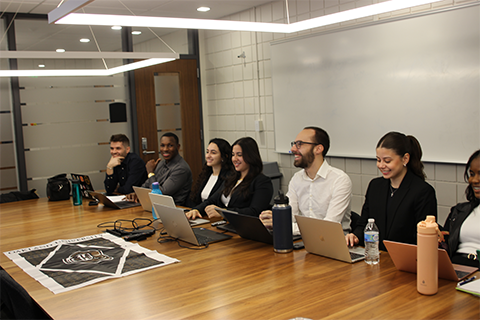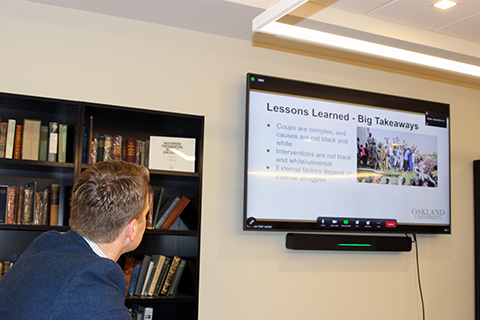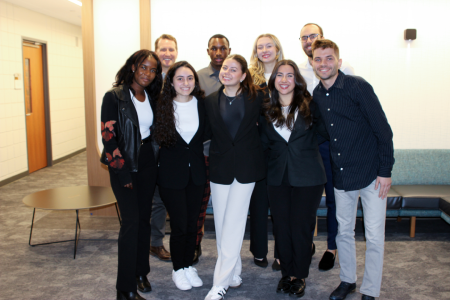OU students present research to State Department officials through Diplomacy Lab partnership

A team of Oakland University students who spent the semester researching the politics of military coups in West and Central Africa recently presented their findings to State Department officials tasked with shaping U.S. foreign policy in those regions.
The virtual meeting was part of OU’s involvement in Diplomacy Lab, a State Department initiative that harnesses research and innovation of university students and faculty to address global challenges.
Under the supervision of Political Science Professor Matthew Fails, students conducted detailed case studies of eight countries in Africa’s Sahel region, examining how legacies of European colonialism have left these countries prone to frequent military coups and civil unrest.
Students mined diverse data sources, from public opinion polling, national statistics, the work of journalists and historians, and even social media, to gain insight into how everyday citizens view the legacies of colonial influence in their respective countries.This past week, the students shared their case studies with U.S. diplomats and other foreign services specialists enrolled in West and Central Africa training courses at the State Department’s Foreign Service Institute. They also answered questions and concluded their presentation with policy suggestions to prevent future military coups.

Students shared key takeaways that could help shape U.S. foreign policy in the Sahel region.
“This was a really great opportunity to provide critical information and training to U.S. foreign policymakers, and our hope is that they can use this information when thinking about how they’ll engage with domestic partners and nongovernmental organizations as they head to post in the region,” said Fails. “It’s a clear way that Oakland University students are impacting the foreign policy objectives, strategies and outcomes of the United States, which is really cool.”
The students – juniors and seniors in OU’s Political Science and International Relations programs – worked on the project in a special topics course with Professor Fails. They gleaned several key takeaways, delving into the complex political, social and economic factors that give rise to military coups and exploring potential policy solutions. The experience helped them appreciate the trade-offs and complications involved in policymaking and provided a window into a desired career field.
“Being able to speak with policymakers and diplomats is an incredible opportunity considering I want to become a U.S. diplomat myself,” said Josef Gojcaj, an International Relations major. “It gave me insight into how some of the trainings and courses will go.”
Political Science major Maria Williams decided to take part in Diplomacy Lab after Professor Fails pitched it to students in his data analysis course the previous semester. She credits his mentorship for helping the team stay on track and produce in-depth, informative research that garnered high praise from State Department officials. They included Deputy Director of the Office of West African Affairs Jamal Jafari, who noted that hearing the students 'was like a window into the everyday conversations that occur' at the State Department.

Professor Matthew Fails and his Diplomacy Lab students are pictured. Back row from left: Matthew Fails, Fabrice Kanyamfura, Mallory Waligora and Josef Gojcaj; Front row from left: Percy Masanga, Larissa Giacomin, Sofia Cardoso Afonso, Maria Williams and Alex Verzillo.
“That’s really the goal of the Diplomacy Lab – to help students take their classroom learning and put it into practice,” Fails said. “To get insight into how classroom learning is used in everyday debates about the most pressing political issues the world faces.”
Even though Diplomacy Lab is through the State Department, it is for faculty and students across the university, not just political science and international relations.
To learn more about OU’s partnership with Diplomacy Lab, including opportunities for faculty and student involvement, contact Political Science Professors Peter Trumbore at [email protected] or David Dulio at [email protected].

 December 18, 2024
December 18, 2024







